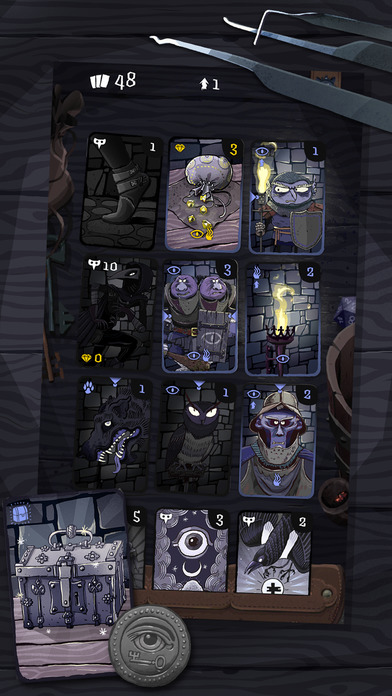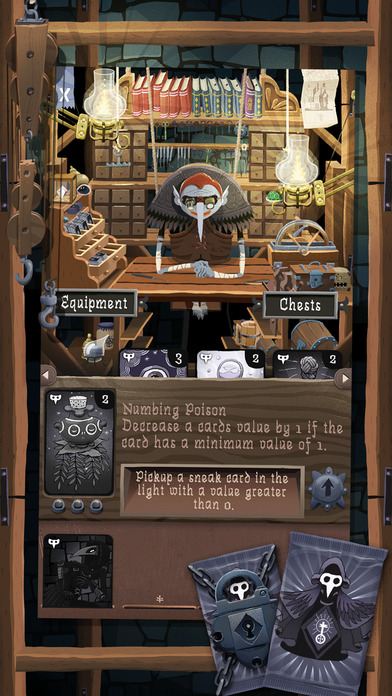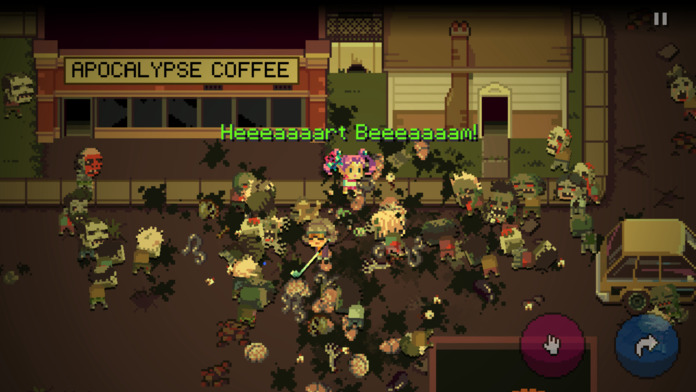 Hello, gentle readers, and welcome to the first (only? WE’LL SEE) Musgravian Musings. I figured if Andy Fretz gets his own Zone, Tasos gets his own Principle, and Carter can Crater all day long, I could do a sort of editorial column of my own. But rather than share strong opinions on the issues, what I’d like to do is to use this space to do some short non-review reflections on recent game releases. In general, these will be games that have caught my interest in some way or another. They’ll also tend to be games that I didn’t review in the first place. I’m going to kick things off by taking a look at two of the biggest recent releases, Card Thief (Free) from TinyTouchTales and Death Road to Canada ($14.99) from Rocketcat Games.
Hello, gentle readers, and welcome to the first (only? WE’LL SEE) Musgravian Musings. I figured if Andy Fretz gets his own Zone, Tasos gets his own Principle, and Carter can Crater all day long, I could do a sort of editorial column of my own. But rather than share strong opinions on the issues, what I’d like to do is to use this space to do some short non-review reflections on recent game releases. In general, these will be games that have caught my interest in some way or another. They’ll also tend to be games that I didn’t review in the first place. I’m going to kick things off by taking a look at two of the biggest recent releases, Card Thief (Free) from TinyTouchTales and Death Road to Canada ($14.99) from Rocketcat Games.
Card Thief
Card Thief is probably my favorite game of the year so far on iOS. I think it’s rather brilliant, albeit in a different way from its spiritual predecessor Card Crawl (Free). If you’ll excuse the pun, that game laid most of its cards on the table right away. The opponent’s deck never changes in terms of what it includes, apart from a few special ability cards. Yet simply by changing the order in which they could appear, Card Crawl was able to create a slightly different challenge each time you played. The game also included plenty of unlockables that would slowly see new elements sprinkled into the deck to help you out. Card Thief is a little more mysterious, and certainly more complicated. I can see why some people aren’t taking to it the way that they might have to Card Crawl.


In the first several games you play of Card Thief, you’re really only engaging with the surface of the game. There’s a tutorial that gives you just about all you need to squeak through a round, but there are two barriers in the design that didn’t have as strong of a presence in Card Crawl. The first is that the mechanics of this game are somewhat complex and hard to explain without having the player go hands-on. After a while you learn about things like distracting the attention of guards and trying to clear the board to restore stealth points, but early on, it’s easy to get confused by what’s going on. Numbers are going up and down and if you missed anything in the tutorial, you might not be able to figure out why. I’m not sure how TinyTouchTales could have addressed this, because I don’t think a bigger information dump is all that helpful, and you can only handhold so far. Is it unreasonable to expect the player to put in a little work of their own? I don’t know, but it’s certainly something that many players will have to overcome.
The other barrier is an artificial one, and it’s perhaps a necessary one in light of what I was just talking about. In Card Thief‘s first castle, it only uses the weakest, easiest-to-handle elements. It’s only when you set foot in the second location that you start to grasp the game’s true nature, and it’s even holding back a little there, too. In effect, the first area is Card Thief‘s real tutorial. In that regard, it’s probably a little on the long side. I think that a tremendous part of the game’s appeal comes in when it’s using every trick in its book against the player. It’s important not to overwhelm someone who is just starting the game, but the first area also risks boring players who think that things are set up similarly to Card Crawl. Unlockables probably keep most players from wandering off of the trail of bread crumbs, but it’s an interesting change from the last game, to be sure. Maybe the second area should open up a little sooner? I feel like anyone who doesn’t get the mechanics of Card Thief by the time the second area opens is unlikely to invest further energy into it, while those who do take to the rules have surely learned the ins and outs well before the more interesting stuff comes.
I’d imagine it’s hard for a designer to decide on things like gating content and gameplay modes. I know a lot of people like having things to unlock, while some others can’t stand that a game about going as far as you can would keep things away from the player before they’ve met an arbitrary number of playthroughs. Anyway, it’s not a huge issue. It’s just that Card Thief gets so very much right that my brain can’t help but wander over to the couple of things it doesn’t do as well. It really is a brilliant game, though. I play a lot of puzzle games, both free-to-play and paid, and this is one of the few of the latter group that is as endlessly compelling to me as the built-to-addict contraptions from the former group. Very well done all-around.
Death Road to Canada
This game is the interactive equivalent of a Sloppy Joe. It’s messy, and bits seem to be falling out all over the place as you try to enjoy it. No matter how you dress it up, its core flavors are so overpowering that every bite seems to taste the same. And yet, every bite is also really delicious. You might get sick of Sloppy Joes while you’re eating them, but then sometimes you’re not eating a Sloppy Joe and all you can think about is eating a Sloppy Joe. And that’s how I feel about Death Road to Canada. There are things about it I really can’t quite come around to loving. The controls sometimes feel like they’re fighting me. Hilarious events sometimes repeat on subsequent playthroughs with identical results, and that pokes holes in the otherwise very clever illusion that every trip is completely different. A good run takes a really long time, so it’s a commitment to load it up in a way that is probably more well-suited to the platform it first released on.

It’s just so darned clever in other ways, though. And I’m not sure that it’s fair that I seem to be holding the game up against some ridiculously big vision I had of the game in the early goings, when it appeared full of infinite possibilities. It’s not a different game every time, not in the way some people might imagine it to be. I think it’s so full of chaotic energy that it’s easy to mistake its true form. I called it a Sloppy Joe, but it’s really more like a stock photo of a Sloppy Joe. It’s trying to look messy in the neatest possible way. Engineered chaos that’s actually quite orderly. There’s a lot of randomness in the game, to be sure, but it’s a game you have to dedicate yourself to learning. It’s not really about having a fully-different experience every time in the explicit sense. Rather, it’s a game where you have to practice, practice, and practice some more until you finally get a combination of good luck and the skill to capitalize on it. Which makes it very much like a prototypical roguelike, the sorts of roguelikes we got before the sprawl that caused the brightest in the genre to account for everything, the kitchen sink, and the kitchen sink’s little mittens.
The events are really just there to keep you smiling as unimaginable quantities of muck fall all over you. Does it matter that this is the sixth time I’ve gotten the same outcome from dealing with bandits when I’m so busy laughing about leaving Jared to be eaten by zombies in a Y’all-Mart parking lot? I say no, but I can also see how the game is turning some people off. It’s a little more guided than it appears, and the only real remedy at times to the aspects of the game that repeat is the player’s own imagination. That’s a risky gamble. Some people prefer to make up their own stories, but others want to have a story told to them. The former are the ones who are more likely to have a great time with Death Road. The latter will probably burn out on the game quickly. They might make it to Canada and feel like that’s enough, or depending on their luck, they might never even get there. This is definitely a game for people who renamed their Final Fantasy characters after all of their friends, their crush, and their family members.
To be perfectly honest, if I look at Death Road from a purely mechanical point of view, I don’t know that I think it’s working well in a lot of places. But I also recognize that there are a lot of ways a game can succeed, and sometimes, for some people, the nitty-gritty mechanics are not that important if everything else is clicking properly. In other words, it might be a pain in the butt to eat, and you might end up with some nasty stains on your shirt from all the stuff slopping out of the buns, but if it tastes good enough, you’re probably not going to care about those problems very much. Death Road to Canada generally tastes that good. Must be in the sauce.
That’s all for the first edition of Musgravian Musings. I have no idea whatsoever when the next one will be, as it’s going to depend less on a schedule and more on when I have things I want to write about. As long as this column doesn’t tank titanically, there will be another one sometime, at least. In the meantime, thanks for reading and be excellent to each other!